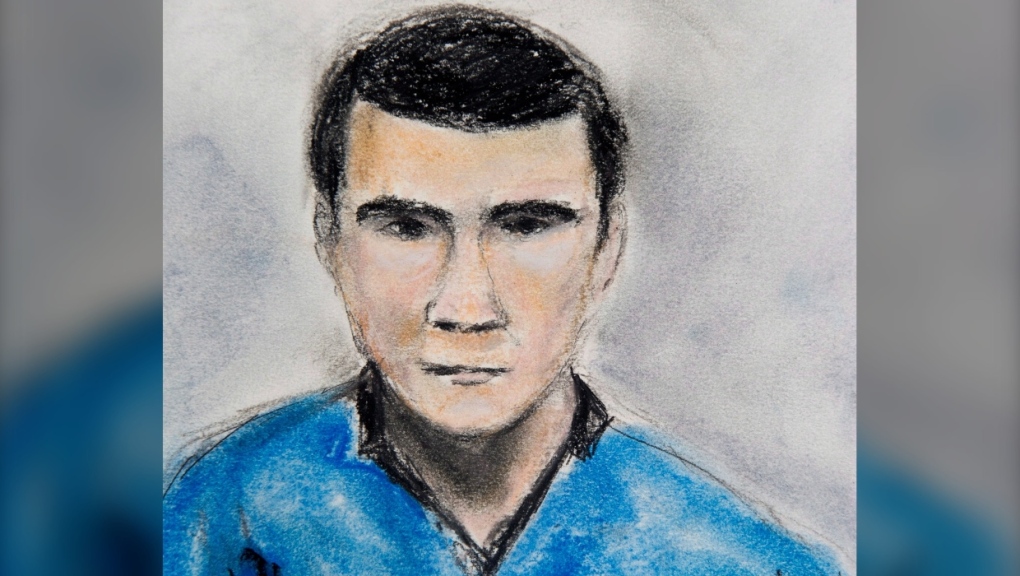Matthew de Grood's main goal is to return to Calgary, board hears
 Matthew de Grood, appearing in Calgary court on April 22, 2014, is shown in this artist's sketch. (THE CANADIAN PRESS/Janice Fletcher)
Matthew de Grood, appearing in Calgary court on April 22, 2014, is shown in this artist's sketch. (THE CANADIAN PRESS/Janice Fletcher)
A review board, which is to decide on further freedoms for Calgary mass killer Matthew de Grood, heard that since the young man's last assessment he hasn't accomplished enough rehabilitation.
The Criminal Code Review Board is meeting on Thursday for the annual review of de Grood, who was found not criminally responsible in 2016 for the deaths of Zackariah Rathwell, Jordan Segura, Kaiti Perras, Josh Hunter and Lawrence Hong at a house party in 2014.
During the hearing, the board learned about de Grood's treatment, which involved both daily oral medication to control the symptoms of his schizophrenia as well as a long-term injectable drug.
The drug has been effective in allowing de Grood to manage his condition during two-week-long unsupervised visits from his group home in Edmonton to southern Alberta, although his doctors said he still maintained access to a daily oral medication.
Dr. Oghogho Manuwa, the head of de Grood's treatment team for the majority of the time since his last assessment, says the trips have proven to help build his independence, but more work is needed.
"It would be fair to say using transport to travel has demonstrated a degree of independence," Manuwa said.
"We do encourage him. He was involved in schooling for two months and decided to stop."
Crown lawyer Wendy Ekert suggested since his last assessment de Grood hasn't accomplished enough rehabilitation.
She asked Manuwa about his report on de Grood's attempts at social interaction at a church group for young men under 30 years old. He told her they were limited.
"(It was thought that if) de Grood was able to be part of a group, he could make connections with society.
"I don't believe he actually went to any of the meetings."
A social worker at the hearing said de Grood has been involved in goal-setting, including vocational and employment goals, but he's put those on hold for now, because his main goal is to move home to Calgary.
To do that, his lawyer Jacqueline Petrie said de Grood needs to be discharged from a team of doctors that have been closely following his treatment, including ensuring that he takes his required medication every day.
Currently, de Grood is being supervised at a group home in Calgary but the next step would allow him to return to his family's home and provide him with more freedoms.
She said there are measures, such as Alberta's Mental Health Act and community treatment orders (CTOs), that could help with his reintegration into society.
 Matthew de Grood
Matthew de Grood
However, under cross-examination by Ekert, Manuwa said both are insufficient in this case.
"People can easily fall in between the cracks," he told the board about the Mental Health Act.
Meanwhile a CTO is an order that allows police to apprehend an individual who they know has gone without a required daily medication.
"Usually it's for that purpose. When the individual takes the medication, they are released again," Manuwa said.
Problems can arise when it may be a day or two, maybe even up to a week before the individual is located.
"I think a CTO cannot adequately manage an individual on oral medication," Manuwa said.
Petrie said, and Manuwa agreed, that de Grood is considered a level 3, or low risk to reoffend.
However, Manuwa said there are more factors that come into play with that assessment.
"There's nothing in the (Violence Risk Appraisal Guide) that speaks to seriousness," he said. "It just predicts behaviour – that's it.
"The particular risk that we are talking about – multiple homicide – doesn't happen every day. You still need more information.
"It is not sufficient when we are talking about a complex forensic patient."
To integrate back into Calgary, the city where the killings took place more than eight years ago, Manuwa suggested it would "pertinent" for de Grood to live in the city for a period of time.
DE GROOD ADDRESSES THE BOARD
De Grood was given an opportunity to address the board and the families of the victims at the end of the hearing.
He said it's never easy because he has to revisit 2014 and the pain it caused but promised he would commit himself to remaining well.
"I want to make it clear today that I have no desire to inflict any more pain on the victims' families and I'm very sorry if my appeals have added to their suffering," he said.
"I respectively ask that the review board consider an absolute discharge for me now. I would also like to be considered for conditional discharge that would allow me to live back home with my parents."
The board will release its decision at a later date.
With files from Bill Graveland with The Canadian Press
CTVNews.ca Top Stories

Stunning photos show lava erupting from Hawaii's Kilauea volcano
One of the world's most active volcanoes spewed lava into the air for a second straight day on Tuesday.
Indigenous family faced discrimination in North Bay, Ont., when they were kicked off transit bus
Ontario's Human Rights Tribunal has awarded members of an Indigenous family in North Bay $15,000 each after it ruled they were victims of discrimination.
What is flagpoling? A new ban on the practice is starting to take effect
Immigration measures announced as part of Canada's border response to president-elect Donald Trump's 25 per cent tariff threat are starting to be implemented, beginning with a ban on what's known as 'flagpoling.'
Hong Kong police issue arrest warrants and bounties for six activists including two Canadians
Hong Kong police on Tuesday announced a fresh round of arrest warrants for six activists based overseas, with bounties set at $1 million Hong Kong dollars for information leading to their arrests.
Heavy travel day starts with brief grounding of all American Airlines flights
American Airlines briefly grounded flights nationwide Tuesday because of a technical problem just as the Christmas travel season kicked into overdrive and winter weather threatened more potential problems for those planning to fly or drive.
King Charles III is set to focus on healthcare workers in his traditional Christmas message
King Charles III is expected to use his annual Christmas message to highlight health workers, at the end of a year in which both he and the Princess of Wales were diagnosed with cancer.
OPP and Ottawa firefighters help remove vehicle wedged into Highway 417 overpass
Ottawa firefighters and local Ontario Provincial Police officers were called to a bizarre scene Tuesday morning along Highway 417, where a driver managed to wedge his vehicle under an overpass.
On Christmas Eve, Pope Francis appeals for courage to better the world
Pope Francis said the story of Jesus' birth as a poor carpenter's son should instill hope that all people can make an impact on the world, as the pontiff on Tuesday led the world's Roman Catholics into Christmas.
Read Trudeau's Christmas message
Prime Minister Justin Trudeau issued his Christmas message on Tuesday. Here is his message in full.

































